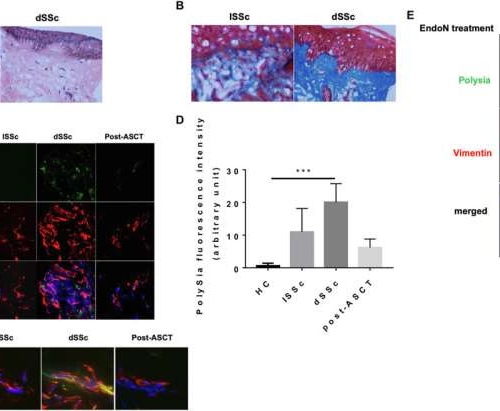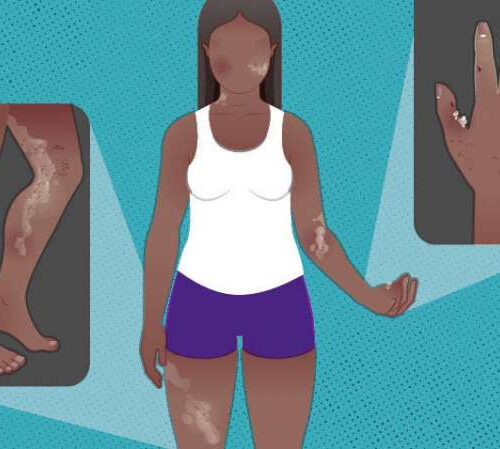by Hospital for Special Surgery Credit: Unsplash/CC0 Public Domain Two new studies led by researchers at Hospital for Special Surgery (HSS) have uncovered key biological mechanisms driving systemic sclerosis (SSc), or scleroderma—a rare and often devastating autoimmune disease that causes fibrosis (tissue hardening) and inflammation. The research, published in the March issue of the Journal of Experimental...
Tag: <span>Scleroderma</span>
Study uncovers new biological marker for scleroderma
by Gillian Rutherford, University of Alberta PolySia expression is highest in the fibrotic skin of dSSc patients. Skin biopsy sections from the different groups were used for our experiments. Credit: Journal of Autoimmunity (2023). DOI: 10.1016/j.jaut.2023.103110A cross-disciplinary University of Alberta research team has uncovered a biological marker for scleroderma that can predict which patients will develop...
Drugs showing promise in cancer trials reduce scarring for scleroderma
Epigenetic drugs that have shown promise in cancer trials significantly reduce scarring in the cells of patients with scleroderma, an incurable and life-threatening autoimmune disease, a new study shows. Scleroderma is a chronic disease that affects the immune system, causing a buildup of scar-like tissues in the skin and internal organs known as fibrosis. This process...
Nanoparticle reduces skin and lung scarring for scleroderma, mouse study finds
The findings provide promise of targeted treatment for patients with the disease. Investigators have discovered that a biodegradable nanoparticle used in medical sutures could combat a rare, sometimes-fatal autoimmune disease. Researchers found that a unique macrophage, an immune cell that removes bacteria or dead cells, plays a key role in the chronic inflammation and scarring...
For scleroderma, algorithm helps better screen for fatal complication
by Noah Fromson, University of Michigan Credit: University of Michigan Screening for a sometimes fatal condition among patients with a rare autoimmune disease could soon—thanks to a computer algorithm—become even more accurate. Researchers at Michigan Medicine found that an internet application improved their ability to spot pulmonary arterial hypertension in patients with systemic sclerosis, or scleroderma. The unpredictable condition is marked...
Scleroderma Support: Patients Find Help Online
Scleroderma is a rare autoimmune disease, affecting about 300,000 Americans, but for those it affects it can be challenging to manage. The disease is associated with chronic inflammation and fibrosis in the connective tissues and visibly results in hardening and tightening of the skin, among other symptoms. Depending on the severity, patients can also experience issues with internal organs....
PROMISING NEW DRUG STOPS SPREAD OF MELANOMA BY 90 PERCENT
Michigan State University researchers have discovered that a chemical compound, and potential new drug, reduces the spread of melanoma cells by up to 90 percent. The man-made, small-molecule drug compound goes after a gene’s ability to produce RNA molecules and certain proteins in melanoma tumors. This gene activity, or transcription process, causes the disease to...


